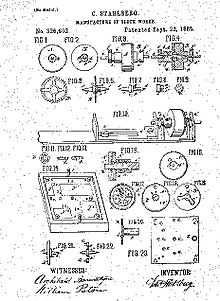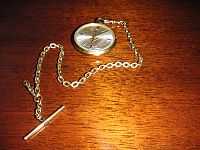Westclox

Westclox was a former manufacturer and is a current brand of clocks and alarm clocks. The company's historic plant was located in Peru, Illinois.
Early history as United Clock Company
Charles Stahlberg and others from Waterbury, Connecticut originally formed as "United Clock Company" on December 5, 1885 in Peru, Illinois, intending to manufacture clocks based on a technological innovation by Stahlberg. This innovation was patented by Stahlberg on September 22, 1885 (US patent #326,602) and involved the use of molded lead alloy movement plates with inset brass bushings as well as lead alloy gear assemblies. Shortly after being granted the 1885 patent, United Clock Company went bankrupt, and there are no known surviving examples of the patented clock.


Bankruptcies, reorganizations, and mergers
In 1887, the company reorganized under the new name "Western Clock Company." The company again went bankrupt, and was reorganized by F. W. Matthiessen in 1888 as the "Western Clock Manufacturing Company." In 1908, the company was granted a patent for the "Big Ben" alarm clock movement. This movement has a "bell-back" design, which means that the bell mechanism is integral to the clock's case. The company first brought the Big Ben to market in 1909. The company's name was shortened to "Western Clock Company" in 1912. In 1910, the Big Ben became the first alarm clock advertised nationally, with ads placed in the Saturday Evening Post.
The modern trademark of the company, "Westclox," first appeared on the backs of Big Ben alarm clocks from 1910 to 1917. The name appeared on Big Ben dials as early as 1911. The trademark was officially registered by the company on January 18, 1916.
In 1919, Western Clock Co., Ltd., was incorporated. Twelve years later, in 1931, the company merged with Seth Thomas Clock Company, with both companies becoming divisions of General Time Corporation. The Westclox unit became known as "Westclox Division of General Time Corporation" in 1936.
World War II wartime efforts

In 1938, Westclox introduced their first portable travel alarm clock to the market. During World War II, Westclox and other General Time Corporation subsidiaries produced aviation instrumentation and control components, compasses for the United States Army, and clocks for the United States Navy. From 1942 to 1945, Westclox ceased all production intended for domestic civilian sale and dedicated its production resources to the war effort, becoming a major manufacturer of fuses for military ordnance.
Watches
The Westclox company was a major manufacturer of dollar watches. They started production of an inexpensive, back-winding pocket watch in 1899, which was intended to be affordable to any working person and continued producing cheap pocket watches into the 1990s.
Late 20th century developments
In 1959, Westclox introduced and patented their "drowse" alarm, which was one of the first of its kind powered by electricity, which integrated what is now more commonly known as a "snooze" function. Talley Industries acquired General Time in 1968. 1972 saw Westclox's introduction of the quartz movement. In 1988 General Time was purchased by its management from Talley Industries. Another bankruptcy shortly followed, with the "Westclox" and "Big Ben" trademarks being acquired by Salton, Inc. in 2001. In October 2007, Salton sold its entire time products business, including the Westclox and Ingraham trademarks, to NYL Holdings LLC.[1]
2012 New Year's Fire
In the early morning of January 1, 2012, a fire broke out at the Westclox compound in Peru, IL. The fire destroyed about 50% of the structure. Two teens were charged with aggravated arson; Steven M. Gallacher (then 17) of LaSalle, IL, and an unidentified minor (then 16). The fire required firefighters and police from 20 surrounding municipalities to extinguish. One firefighter, LaSalle fireman Steve Smith, sustained a career-ending injury when a firehose attached to a hydrant popped loose and the metal coupling on the end hit him in the leg. Gallacher was convicted of aggravated arson on October 11, 2012 with a sentence of 6-30 years without the possibility of probation. Gallacher's sentence of aggravated arson was the direct result of the fire plus Smith's injury. [2]
See also
References
- ↑ "Summary of SALTON INC – Yahoo! Finance". November 13, 2007. Retrieved October 22, 2008.
- ↑ http://newstrib.com/main.asp?SectionID=2&SubSectionID=27&ArticleID=23214
External links
- Official website
- Historic American Engineering Record (HAER) No. IL-83, "Western Clock Company, Peru Factory"
- History of Westclox at Clockhistory.com
- New Year's Day fire radio traffic from Radioman911.com